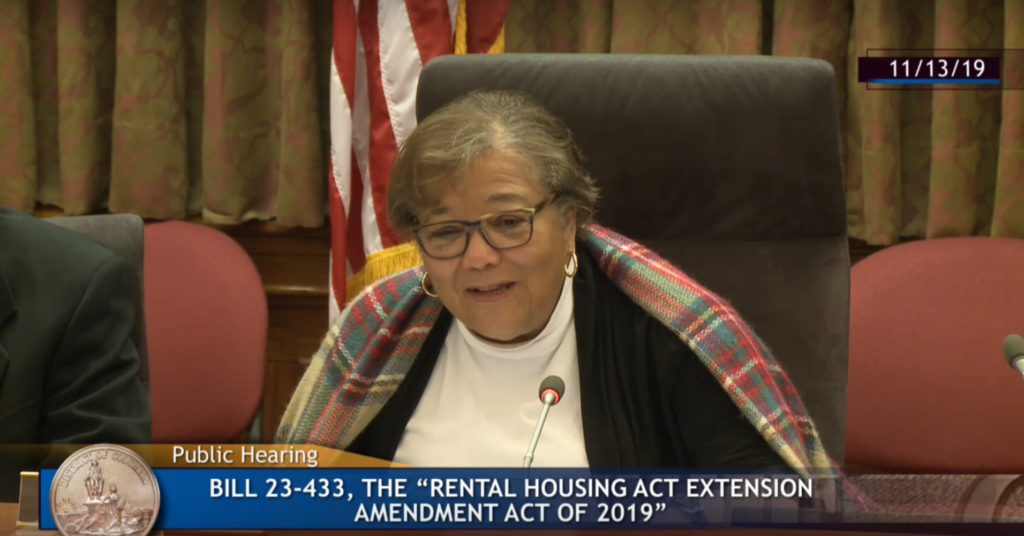On Wednesday, Nov. 13, the Council of the District of Columbia hosted a public hearing regarding bill B23-0433, also known as the Rental Housing Act Extension Amendment of 2019. The original bill, the Rental Housing Act of 1985, provided rent control from 1985 to 2020. A revision of the bill would extend its rent control policies to Dec. 31, 2030. Attendees were invited to speak in favor of amending the bill, as well as suggest potential improvements to the existing rent control program.
As described by Councilmember Anita Bonds, who conducted the meeting, “rent laws are enacted to eliminate unfair bargaining advantage[s] that providers have over customers who are forced to shop for apartments in an overheated, desirable housing market.”
Due to rapid growth, rent control regulations have historically been important for Washington, D.C. The Rental Housing Act of 1985 covered residential rental dwellings in D.C., including apartments, houses, and individual rooms for rent within houses, with exceptions for properties subsidized by either the federal government or the District, properties built after 1975, properties owned by a landlord who owns more than four rental units in D.C., and properties that were vacant when the rent control law took effect. Its stipulations limited property owners from taking advantage of renters. For example, landlords are not allowed to raise the rent if they have done so within the last 12 months, nor may they raise the rent if they have violated the terms of the lease. The rent laws also maintain that property owners must give a 30-day notice of any increase in rent and must limit the amount the rent is increased. In most cases, rent increases are limited to the Consumer Price Index plus 2 percent, and may not be more than 10 percent total.
Several community members and leaders expressed support for extending the bill while also expressing support for modifications to the bill that would protect renters in more targeted ways.
At the hearing, Elizabeth Falcon, Executive Director of DC Jobs with Justice, emphasized that the District should keep the price of rent-controlled units low, capping annual rent increases at the level of inflation and eliminating the currently allowed extra two percent increase. Falcon opined that there should be a direct relationship between the cost of rent and the D.C. minimum wage, such that like the minimum wage, rent increases should not exceed the rate of inflation. The Director of the grassroots organization People for Fairness Coalition, Robert Warren, would like to see rent control expand to all of D.C.’s most vulnerable people, especially poor residents, people living on fixed incomes and minority residents in the District.
Beth Harrison, an attorney at the Housing Law Unit Legal Aid Society, believes that hardship petition policies and rates are too high and outdated. Under the Rental Housing Act of 1985, landlords may submit a hardship petition if they are not earning a rate of return of 12 percent or more on the rental. If the petition is approved, they may increase the rent amount.
“I think we need to recognize that this part of the law, this formula, asks tenants to pay higher rents to guarantee to landlords a very high rate of return, which is something that we don’t do for any other business or industry,” said Harrison.
Although her organization is supportive of extending the rent laws, Lisa Mallory, CEO of the DC Building Industry Association, had some critiques of the project. Mallory opined that rent control or stabilization is an ambitious project and a costly policy goal. Her view is that rent stabilization does not further the District’s goals for affordable housing since the bill does not address the reasons why rent rates are rising in the first place. Mallory is also concerned that rent caps will undermine the city’s ability to meet clean energy targets, stating that caps on rent make it difficult to invest in environmentally friendly buildings.
Overall, according to Falcon, the public hearing for B23-0433 – Rental Housing Act Extension Amendment Act of 2019 was evidence of “our collective dedication to expand and protect rent control, [which] comes from our shared understanding that cost of housing in D.C. is growing at a rate that is untenable for each of our constituencies.”
“There has to be an accountability for public housing,” Robert Warren said.
The bill remains under review by D.C. Council.








